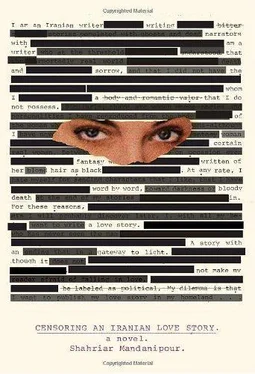Guess!
Please do not refer to your own personal experiences.
I suspect you have guessed wrong. No, Khosrow does not attack Shirin. Instead he flops down on the bed and falls asleep. Yes, precisely at that tender and fateful moment …
Now I’m thinking that perhaps one reason Macedonian, Arab, Turk, Mongol, Afghan, and English invaders could so easily and effectively occupy the magnificent empires of Iran was exactly this. Our kings had the habit of falling asleep precisely at tender and fateful moments, moments when they had to be men, to be strong, to be hard, and to occupy something small and sweet, and by the time they woke up, all was lost, and not only their kingdom but their wives, slaves, and sisters had been occupied.
Fortunately, however, at least in Khosrow and Shirin’s story, the king does not wake up to the angry face of a Macedonian or a Mongol or an Afghan. Instead he sees his Shirin sleeping beside him like a flower; and at last, he begins the much-delayed labor.
In an old Iranian text, about four hundred years ago, at a time when censorship was still not so powerful and institutionalized, in describing a scene of 66, an Iranian writer used weaponry and warfare metaphors quite successfully. He wrote: He raised the meaty mace and pounded it against the tallow shield.
However, Nizami, that delicate-natured poet, did not favor such violence. He instead depicted scenes of lovemaking in this manner. Khosrow loses patience and begins to kiss and fondle Shirin. In other words, he begins to lick sweets and suck candy. Beside these comparisons, like the slow-motion replays of scored goals in sports matches, the poet again compares these actions to planting and gardening: At first he began gathering flowers,
like blooms on that face laughter blossoms.
…
Then together, the poet and Khosrow begin picking fruits: Of apple and jasmine sugar-plums he made,
at times with pomegranates and narcissus he played.
…
I assume you can discern the body parts that apple and jasmine represent. To increase your knowledge of fruitology, I reiterate that in Iranian literature, pomegranates are generally used to talk of, or not to talk of, small firm breasts that fit in one hand. Narcissus is generally a reference to beautiful eyes, but I doubt that Khosrow, at the height of his excitement, can be bothered to play with Shirin’s eyes. Therefore, narcissus could be a simile for Shirin’s orchid.
The replay of the scored goal sometimes extends to wildlife: Now and then the white falcon the king’s grasp fled,
now and then the pheasant upon his chest perched.
…Now and then such pleasure came from flight,
that the dove prevailed upon the hawk.
…
These verses are a work of genius in depicting a sex scene in which the woman is active. The doe and the lion together travailed,
upon her at last the lion prevailed.
…
Then comes the act of plunging into the jewelry store: Wondrously to the treasure-trove’s depth he went,
with his ruby her agate seal he rend.
…
Meaning Khosrow tore the agate seal of Shirin’s virginity.
Then again we come to a description of Shirin’s food products, and we read of a boneless date, which means a seedless one, that penetrates her. No, it is not over yet. The account of their lovemaking now becomes slightly more human, and in very poetic, beautiful, and perfectly rhyming words we read that: a body has coiled around a body and a soul has reached a soul. No, it is still not over yet. In fact, it is time for the sea and scuba diving: An oyster cradled atop a coral horn,
now water and fire together conjoin.
…
And at last it is over: From fire and water’s colorful scheme,
with cinnabar and quicksilver the nuptial chamber teemed.
…
Meaning there is silver and cinnabar-colored water everywhere.
The garden trekking, zoo traveling, fruit picking, and scuba diving of the two lovers takes an entire day and night, and then the two sleep for an entire day and night…
This too is another discovery of why invaders could occupy our country so easily. When the king spends twenty-four hours in the flower bed, the garden, the zoo, and underwater, and then he sleeps for twenty-four hours, when does he ever find time to run the country?
I hope that after this rather lengthy example, you have come to understand why censorship is so complicated in Iran and why Iranian literature, which is quite rich, is so difficult to translate and to read.
Reading sixty-five hundred verses can take a long time, but Sara quickly finished the book. Contrary to her expectations, Dara’s letter in this book was very short:
“Sara, you probably love Khosrow, a wealthy king, handsome, frivolous, and yet also a strong and brave man who has won many battles and wreaked havoc on the Romans. I don’t think you could love Farhad. A sincere, timid, and poor lover who kills himself when he loses hope of ever having Shirin. Yet he never cheated on his love in order to forget … But I think Khosrow and Farhad are two sides of the same coin. They complement each other. It is when the two are joined that they create a true lover …”
The next book was Milan Kundera’s The Unbearable Lightness of Being. It was impossible for this politico-erotic novel to be among the books at the library. But Sara, following the instructions given to her in the letter, found it hidden behind a stack of dusty books by Avicenna, the legendary tenth-century Iranian philosopher and physician. She first deciphered the letter, and after reading it several times, she read the novel. She read ravenously and of course in many places she became terribly stressed. Many scenes in the book had been censored and replaced with the infamous ellipses.
Two months have passed since Sara read that first novel, and now the curtains in her room are always open, except for times when she wants to change her clothes. The image of a beautiful girl sitting at the window of a beautiful house is a romantic and male-attracting scene throughout the world. As a result, Sara found a few new admirers. As soon as they saw her at the window, they would line up on the sidewalk across the street from her house and stare at her. But Sara was sure Dara was not among them, because they were all so boorish looking. Some of them were even vulgar; they would whistle at her, or they would make funny gestures with their hands, eyes, and lips. Sara’s father, a traditional man who took great care of his daughter’s untouched flower, had become extremely angry by the constant presence of the young men and had made up his mind to call the police. However, three days later, the pestering admirers had all disappeared.
Sara was growing more restless and curious by the day to see Dara. Of course she herself had labeled her emotions as mere curiosity. She had created a vague image of his face in her mind and with the aid of her imagination she would add features to this hazy image, and this further fanned the flames of her curiosity.
In the next letter she read:
“Don’t worry about those pests. They don’t even dare walk past your house anymore. But you shouldn’t spend too much time sitting at the window either. Not that I don’t like it, but I’m afraid your next admirer may be a roughneck. My left eye is still bruised from one of them punching me … Why don’t you write to me? Haven’t I convinced you that you can trust me? What trouble could you get into if you only encode a few words to me? The letter won’t even be in your handwriting and you can completely deny it whenever you want …”
Читать дальше












